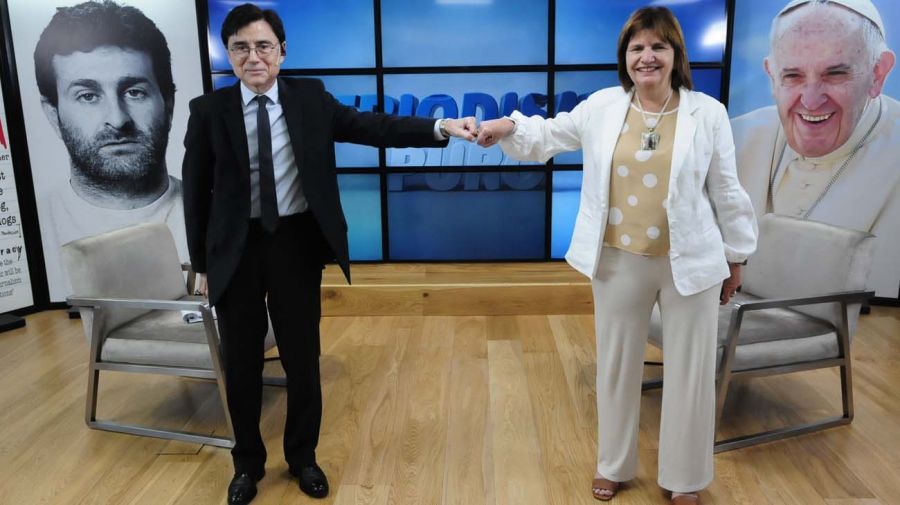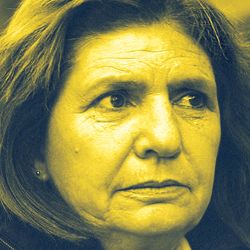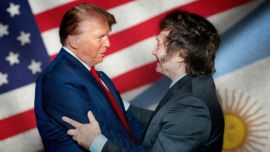Adopting stances more “hawkish” in style and with a discourse also geared to moderates, PRO party chair Patricia Bullrich explains how Juntos por el Cambio experienced the upheaval stemming from Máximo Kirchner’s resignation from the helm of the ruling coalition.
Bullrich, 65, says that an agreement with the IMF could be much lighter than the one signed by Cambiemos in 2018. The former security minister, who has said she dreamt of being president since aged six, maintains that her party could advance towards less of a personality cult and that Mauricio Macri has a key role in that evolution.
This interview was conducted prior to the Russian invasion of Ukraine and the government’s announcement that it had finalised an agreement with the International Monetary Fund.
In 2020 you tweeted: “Yes, Máximo, you beat us at the cost of lying to the country. Yesterday the pensioners, today the farmers, the workers, the shopkeepers.” Then in August, 2021, you tweeted: “Violence breeds violence,” directed at the now ex-chief of the Frente de Todos caucus. How would you define the leader of La Cámpora? How do you explain this event in particular?
Máximo Kirchner is in a pretty uncomfortable place. It’s very negative when upon presenting a scheme of government to society, you walk out on the fight for something you proposed.
We have quite a few examples of such defections. They never ended up well because the commitment taken on by a team, the construction of that Frente de Todos, is to start and finish together, in the rough and the smooth. It would seem that he only wanted the easy part. That reminds me of Chacho Álvarez. When the going got tough, he got out. That’s something very opportunistic. It also responds to an antiquated outlook from when Peronism was the centre of the political system, bestowing or destroying governance. It’s something often seen – in the Isabel Perón government or the struggles between Carlos Menem and Eduardo Duhalde, in the few days during which Adolfo Rodríguez Saá lasted in the presidency. When at the centre, such events made the whole system ungovernable. With a two-party – or rather two-coalition – system, with an opposition with the capacity to replace it, these events shake up the chessboard less, something new and very good for the country.
Lastly, Máximo Kirchner compares the current situation with that of his father but the circumstances are different. Today the country is in need of an agreement with the International Monetary Fund. It’s a pretty light agreement compared to what the IMF made our government sign in 2018. Nevertheless, he sees it as a betrayal but it is a source of financing. Afterwards we will see what must be done. It would seem that they did not want to do anything, they wanted the country to continue sliding downwards.
Néstor Kirchner urged resignation after the “not positive” vote of [then-vice-president] Julio Cobos in the conflict with farmers. After the last PASO primaries, several Kirchnerite ministers presented their resignation and now the caucus chief has gone through with it. Is there a guiding strand in these attitudes?
It’s this idea of “either we do things the way I want or I boycott my own government”: I divide it, I debilitate it and really that is very much authoritarian. Childish, too. You’re caucus chief, you have an institutional responsibility with your president, and vice-president, elected by millions of people. The latter is his mother, a former two-term president. Even so at the first problem which crops up, he takes this attitude.
Does his mother disagree with him?
His mother has her eloquent silences. She often falls silent when she does not want to express herself but when she does, she says it all. I perceive Cristina Kirchner’s silence as a “thumbs down.”
You met up with Mauricio Macri in the south, tweeting: “We shared with Mauricio Macri in Villa La Angostura a common concern for the country’s lack of direction. We’re going to work with all Juntos por el Cambio leaders. Our premise is clear: 2022 is a year to consolidate our links with society and not to think of candidacies.” Two candidacies have been tacitly launched, yours and Horacio Rodríguez Larreta’s, along with the doubts as to whether Macri will run or not. He publicly says no. Don’t you fear being used by Macri and that he finally ends up making a deal with Rodríguez Larreta, using you just to undermine him?
The important message for society is that this is not a year for candidacies. I have faith in building up a deep social bond and that will determine what’s going to happen.
I do not mistrust Mauricio Macri at all and nor do I ask him to support me, only what I’m doing when chairing his PRO. He’s the founder of a party which should have increasingly deeper roots. If it comes to that scenario of Horacio and I facing off amicably in PASO primaries, it would not be good for us to ask for his blessing. We’re too grown-up to ask him for it. Whoever runs that race should do so with their own efforts, achievements, life history, ideas and convictions. Mauricio Macri has to belong to everybody. I’d never ask him to support me and I wouldn’t like it if he backed Horacio. He must support and strengthen the coalition. There are other candidates from other parties. He was the president of us all, that should be his place.
I understand and what you say sounds very plausible to me. But history shows, in the case of Gabriela Michetti, that Macri finally reached an understanding with Horacio Rodríguez Larreta and that there was no judgement of Solomon between the candidates.
We will see. But the decisions are not taken according to who backs you but according to your own convictions as to the role you should play in your country.
Have you had or do you have residence in Buenos Aires Province?
I never had residence in BA Province. In 2016 my mother died and I have an inheritance there, along with the rest of my family.
In Buenos Aires Province the demand for a discourse like yours is much greater. The crime suffered there is much greater than in Buenos Aires City. You cannot win the presidency without winning in Buenos Aires Province. Have you thought of what a landslide there could mean for Juntos por el Cambio, establishing an agreement for co-government with the presidential candidate?
No district could survive without a national government taking the correct strategic decisions, changing the business climate, social life and the popular mood. Today’s Argentina is anxiety-ridden. We must bet on that and seek a good gubernatorial candidate.

Would you like to be a gubernatorial candidate?
There are various people who can carry forward that role. That last election was won by Diego Santilli but Javier Iguacel is demonstrating a totally revolutionary model in governing a small place [as mayor of Capitán Sarmiento], lowering 110 taxes and thus showing that you can lower taxes and expand their base.
How is your relationship with Radicalism?
Fine. It was very interesting that in the PASO primaries people showed greater energy in backing the lists of both parties when they clashed.
Would you have preferred competing lists as in Córdoba and not each party on its own account, as occurred in Buenos Aires Province?
[Better to] repeat the experiences of Córdoba, Chubut or La Pampa.
Would you like [Jujuy Radical Governor Gerardo] Morales as your running-mate, for example?
I don’t want to give names. People value the coalition. And within the coalition they give PRO a determined place, more executive or administrative. And the Radicals are valued for their baggage of ideas and so many years of history. That’s a good combination. If you look at all the Argentine provinces, there were competing lists everywhere. That gives society the sensation of boosting the idea of the coalition.
What would your strategy for the City be if Rodríguez Larreta cannot be re-elected?
What a pity! But, well, he’s already had his two terms.
Do you see him as a better mayor than Macri himself?
Horacio has already had his two terms and our Constitution is strict. But it seems to me that there are many people in Buenos Aires, some much younger and others less-known but with plenty under their belts. [Deputy] Waldo Wolff projects far. He’s a hard-working person with clear ideas.
There’s a book by the historian Pablo Stefanoni entitled ¿La rebeldía se volvió de derecha?, or “Have the rebels gone right again?” Within it, he argues that rebels who normally came from the left previously are now on the right. What is your vision of that phenomenon, which can be seen all over the world?
The left has not adopted any of the changes necessary to understand a society seeking other things: more creativity and freedom, desiring more respect for business and understanding of how capitalism and the world work. I’m referring to the classic left. The social democrats, who in the 1980s and the 1990s did understand this like Brazil’s Fernando Henrique Cardoso or Spain’s Felipe González, are something different.
Does society find that leftist and centre-leftist governments have not produced the responses expected of them?
The centre-left did understand. You have to think of how Fernando Henrique Cardoso or Felipe González were defined when they began their governments. The same could be said of the Democrats [in the United States], of Michelle Bachelet or Ricardo Lagos [in Chile].
But what happened to the progressives?
The welfare state which was born to accompany workers in a way that they had not been since the Industrial Revolution has turned into a malware state, into a topheavy state with a poor quality of services, especially in Latin America. This transition has caused enormous distress. Furthermore, the world is starting to value other things: freedom as a concrete, not abstract concept.
The Italian sociologist Enzo Traverso, also interviewed in this series, has spoken of the “melancholy of the left.” In other words, the right has taken over rebellion, leaving the left nostalgic for 40 or 50 years ago. Is that also happening to Máximo Kirchner?
Left and right continue being hard to define in Argentina. We’ve achieved something unprecedented. Peronism was a mass movement occupying all the political space. With Cambiemos we set a limit to that, fencing them in so that they could not enter into our space nor could we into theirs. That ordered the system of ideas. That is not so much left and right but populism and republicanism with different aspects. Could it be said with any exactitude that Kirchnerism is a left-wing movement with Juntos por el Cambio on the right? The Argentine matrix is different. We are situated in different fields but there is a neutral zone with elections being won by those who occupy it. But Juntos por el Cambio has a hard-core vote.
We have done several interviews and I note you as trying to captivate that neutral zone. I already see you campaigning for 2023 because I see you as more moderate and centrist for that neutral sector in order to reach the presidency. What would you do with the libertarians?
Get them in. I’d love to have them inside with us.
Wouldn’t that repel that moderate sector with which elections are won?
If Argentina has these two squares, on whose side are the libertarians? Our side.
Your typology is not right or left but republicanism or populism. Does the difference lie in the method?
That would be authoritarian populism and democratic republicanism. Where do you put the liberals in these times when Peronism is united? The Peronists who are on this side are within the conceptual framework. The clearest is [Miguel Angel] Pichetto.
Why not put liberals on this side? Are you going to throw them out because they have histrionic personalities? You have to search out people for their ideas. They have some ideas for the economy to come to earth. Everything which starts out as a political philosophy has to come to earth in reality or else the reality has to come to earth.
Governments are constructed by seeing how you achieve your maximum objective, not deviating from your objective and carrying it through. Because if your maximum objective is to go in one direction and not to move from there, it’s worse - you won’t get there. Flexibility is required. If so many youngsters adhere to the ideas of liberty, feeling themselves to be libertarians, they’re on this side of the fence.
For the first time in many years those squares are clear. Perhaps in 1983 they were also clear. There was Peronism on one side and the great democratic movement headed by [Raúl] Alfonsín, on the other.
Is the vector changing, having been in 1983 democracy and republicanism versus the agreement with the dictatorship whereby crimes against humanity could be included in the statute of limitations, as [Peronist candidate] Ítalo Luder said? A frontier which could be repeated in 2023?
We like to say that we are the first government to serve out its full term since Marcelo T. de Alvear in 1928.
The first non-Peronist government, you mean.
Juntos por el Cambio places itself in that tradition. We’re talking about Alvear. We’re not including that Adolfo Rodríguez Saá did not finish his term and nor did Eduardo Duhalde, and not just because of a question of Peronism or anti-Peronism. We’re saying that from our roots, from a tradition.
Does Alberto Fernández seem authoritarian to you and not republican?
I don’t see much conviction there. Some days I see him as authoritarian and other days I see him as republican. When they march against the Supreme Court, I see him as authoritarian. When he delivers a bucolic speech on the IMF in which he says we’re all going to be OK, I see him as more democratic. It seems that he has no convictions but goes where the wind takes him. Today Argentina needs convictions to come out of the crisis, from where we are.
Would Juntos por el Cambio in 2023 need what Umberto Eco described as the true work requiring independence from its author?
That has already begun to pass into something very important, which for me is a great virtue of Mauricio Macri. In Argentine history only two parties have managed to transcend their founders – the Radicals and the Justicialist Party or Peronism. The rest all died. PRO is the third party passing into history, as the anti-personalist Radicals might have said, and that for me is very important because it speaks of the virtue of the man who founded it.
Will Kirchnerism remain trapped in a surname?
Yes, in a single family.
“Kirchnerism heading more towards Daniel Ortega than Felipe González”
In this same series of interviews, Miguel Ángel Pichetto said that in future La Cámpora, due to its sheer proximity to power and the advancing age of its members, will evolve towards some form of social democracy. To simplify, he thinks that when they grow up, its members will be social democrats. Does Máximo Kirchner’s resignation indicate that Miguel Ángel’s forecast was erroneous, that Kirchnerism will split up with some turning more social democratic and joining traditional Peronism while others remain more isolated and radicalised?
I would dissent here with Miguel Ángel. Social democracy is an evolution towards a democratic and republican society with separation of powers, accepting the rules of democracy. It comes from the left but entering into a more republican phase. In contrast, Kirchnerite Peronism is evolving more towards an autocratic system. Kirchnerism is heading more towards Daniel Ortega than Felipe González. That’s the direction in which Máximo is to be seen.





















Comments